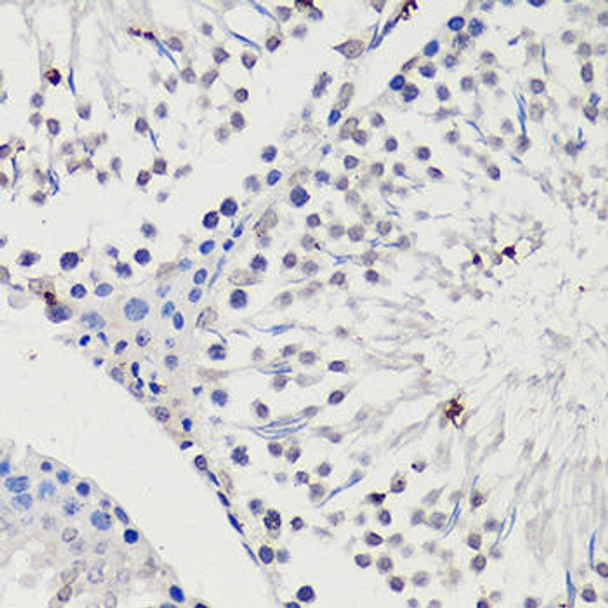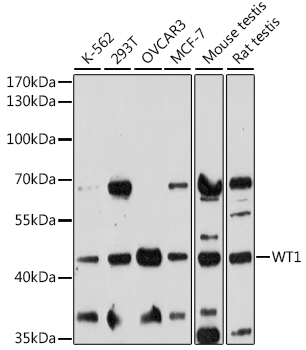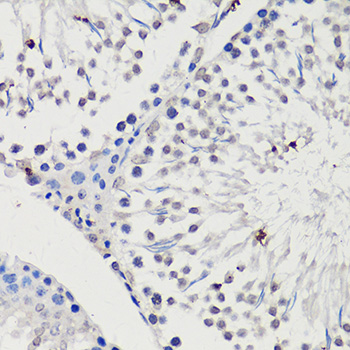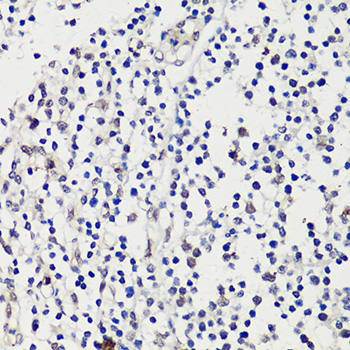Anti-WT1 Antibody (CAB16319)
- SKU:
- CAB16319
- Product type:
- Antibody
- Reactivity:
- Human
- Mouse
- Rat
- Host Species:
- Rabbit
- Isotype:
- IgG
- Antibody Type:
- Polyclonal Antibody
- Research Area:
- Epigenetics and Nuclear Signaling
Description
| Antibody Name: | Anti-WT1 Antibody |
| Antibody SKU: | CAB16319 |
| Antibody Size: | 20uL, 50uL, 100uL |
| Application: | WB IHC IF |
| Reactivity: | Human, Mouse, Rat |
| Host Species: | Rabbit |
| Immunogen: | Recombinant protein of human WT1 |
| Application: | WB IHC IF |
| Recommended Dilution: | WB 1:500 - 1:2000 IHC 1:50 - 1:200 IF 1:50 - 1:200 |
| Reactivity: | Human, Mouse, Rat |
| Positive Samples: | K-562, 293T, OVCAR3, MCF-7, Mouse testis, Rat testis |
| Immunogen: | Recombinant protein of human WT1 |
| Purification Method: | Affinity purification |
| Storage Buffer: | Store at -20°C. Avoid freeze / thaw cycles. Buffer: PBS with 0.02% sodium azide, 50% glycerol, pH7.3. |
| Isotype: | IgG |
| Sequence: | Email for sequence |
| Gene ID: | 7490 |
| Uniprot: | P19544 |
| Cellular Location: | Cytoplasm, Nucleus, Nucleus speckle, nucleolus, nucleoplasm |
| Calculated MW: | 33kDa/34kDa/47kDa/48kDa/49kDa/55kDa/56kDa |
| Observed MW: | 49kDa |
| Synonyms: | WT1, AWT1, EWS-WT1, GUD, NPHS4, WAGR, WIT-2, WT33 |
| Background: | This gene encodes a transcription factor that contains four zinc-finger motifs at the C-terminus and a proline/glutamine-rich DNA-binding domain at the N-terminus. It has an essential role in the normal development of the urogenital system, and it is mutated in a small subset of patients with Wilms tumor. This gene exhibits complex tissue-specific and polymorphic imprinting pattern, with biallelic, and monoallelic expression from the maternal and paternal alleles in different tissues. Multiple transcript variants have been described. In several variants, there is evidence for the use of a non-AUG (CUG) translation initiation codon upstream of, and in-frame with the first AUG. Authors of PMID:7926762 also provide evidence that WT1 mRNA undergoes RNA editing in human and rat, and that this process is tissue-restricted and developmentally regulated. |
| UniProt Protein Function: | WT1: a DNA binding protein and apparent transcriptional regulator. Recognizes and binds to the DNA sequence 5'-CGCCCCCGC-3'. Expressed in the kidney and a subset of hematopoietic cells. Defects in WT1 are the cause of Wilms tumor 1 (WT1), an embryonal malignancy of the kidney that affects approximately 1 in 10'000 infants and young children. It occurs both in sporadic and hereditary forms. Four alternatively spliced isoforms have been described. |
| UniProt Protein Details: | Protein type:DNA-binding; C2H2-type zinc finger protein; Tumor suppressor; Transcription factor; Nucleolus Chromosomal Location of Human Ortholog: 11p13 Cellular Component: nucleoplasm; cytoplasm; nucleolus; nuclear speck; nucleus Molecular Function:protein binding; zinc ion binding; RNA binding; sequence-specific DNA binding; transcription factor activity Biological Process: tissue development; gonad development; positive regulation of apoptosis; positive regulation of transcription, DNA-dependent; heart development; thorax and anterior abdomen determination; negative regulation of transcription from RNA polymerase II promoter; glomerulus development; germ cell development; negative regulation of cell proliferation; regulation of transcription, DNA-dependent; epithelial cell differentiation; ureteric bud development; male genitalia development; vasculogenesis; kidney development; camera-type eye development; transcription, DNA-dependent; adrenal gland development; RNA splicing; glomerular basement membrane development; male gonad development; sex determination; regulation of transcription from RNA polymerase II promoter; ureteric bud branching; negative regulation of translation; positive regulation of transcription from RNA polymerase II promoter; negative regulation of cell growth; negative regulation of transcription, DNA-dependent; negative regulation of apoptosis Disease: Wilms Tumor, Aniridia, Genitourinary Anomalies, And Mental Retardation Syndrome; Denys-drash Syndrome; Mesothelioma, Malignant; Nephrotic Syndrome, Type 4; Frasier Syndrome; Aniridia; Wilms Tumor 1; Meacham Syndrome |
| NCBI Summary: | This gene encodes a transcription factor that contains four zinc-finger motifs at the C-terminus and a proline/glutamine-rich DNA-binding domain at the N-terminus. It has an essential role in the normal development of the urogenital system, and it is mutated in a small subset of patients with Wilm's tumors. This gene exhibits complex tissue-specific and polymorphic imprinting pattern, with biallelic, and monoallelic expression from the maternal and paternal alleles in different tissues. Multiple transcript variants have been described. In several variants, there is evidence for the use of a non-AUG (CUG) translation initiation site upstream of and in-frame with the first AUG. Authors of PMID:7926762 also provide evidence that WT1 mRNA undergoes RNA editing in human and rat, and that this process is tissue-restricted and developmentally regulated. [provided by RefSeq, Oct 2010] |
| UniProt Code: | P19544 |
| NCBI GenInfo Identifier: | 139778 |
| NCBI Gene ID: | 7490 |
| NCBI Accession: | P19544.2 |
| UniProt Secondary Accession: | P19544,Q15881, Q16256, Q16575, Q4VXV4, Q4VXV5, Q4VXV6 Q8IYZ5, A8K6S1, B3KSA5, |
| UniProt Related Accession: | P19544 |
| Molecular Weight: | 449 |
| NCBI Full Name: | Wilms tumor protein |
| NCBI Synonym Full Names: | Wilms tumor 1 |
| NCBI Official Symbol: | WT1 |
| NCBI Official Synonym Symbols: | GUD; AWT1; WAGR; WT33; NPHS4; WIT-2; EWS-WT1 |
| NCBI Protein Information: | Wilms tumor protein; amino-terminal domain of EWS|last three zinc fingers of the DNA-binding domain of WT1 |
| UniProt Protein Name: | Wilms tumor protein |
| UniProt Synonym Protein Names: | WT33 |
| Protein Family: | Wilms tumor protein |
| UniProt Gene Name: | WT1 |
| UniProt Entry Name: | WT1_HUMAN |









